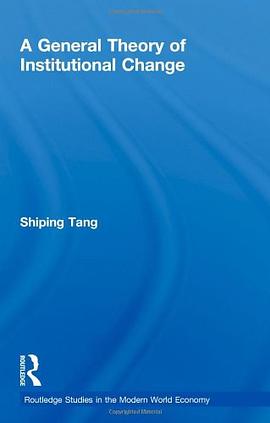A General Theory of Institutional Change
内容简介
Institutional change is a central driving force behind social changes, and thus a central topic in all major fields of social sciences. Yet, no general theory of institutional change exists. Drawing from a diverse literature, this book develops a general theory of institutional change, based on a social evolutionary synthesis of the conflict approach and the harmony approach. The book argues that because the whole process of institutional change can be understood as a process of selecting a few ideas and turning them into institutions, competition of ideas and struggle for power to make rules are often at the heart of institutional change. The general theory not only integrates more specific theories and insights on institutional change that have been scattered in different fields into a coherent general theory but also provides fundamental new insights and points to new directions for future research. This book makes a fundamental contribution to all major fields of social sciences: sociology (sociological theory), political sciences, institutional economics, and political theory. It should be of general interest to scholars and students in all major fields of social science.
......(更多)
作者简介
Shiping Tang is Professor at the School of International Relations and Public Affairs (SIRPA), Fudan Univeristy, Shanghai, China. He has a very broad research interest and has published widely. He is the author of A Theory of Security Strategy for Our Time: Defensive Realism (Palgrave-Macmillan 2010), A General Theory of Institutional Change (Routledge, 2011), and Social Evolution of International Politics (Oxford, 2013, forthcoming). He is also the co-editor of Living with China: Regional States and China through Crises and Turning Points (Palgrave-Macmillan 2009). His most recent journal publications include articles in Chinese Journal of International Politics, European Journal of International Relations, International Security, International Studies Review, Journal of Economic Issues, Journal of Strategic Studies, Review of International Studies, Philosophy of the Social Sciences, Security Studies, and World Politics.
......(更多)
目录
1. Two Major Approaches toward Institutional Change
2. Toward a General Theory of Institutional Change
3. A General Theory of Institutional Change
4. Assessing the General Theory
5. Power/Institutions and Society
Conclusion: Understanding Social Changes
......(更多)
读书文摘
因为制度变迁本质上是从众多观念中择取少数进而将其固化为制度的过程,所以,观念之间的竞争以及对规则制定权的争夺通常居于制度变迁的核心位置。
从众多观念中择取少数进而将其固化为制度的过程,可以通过社会进化的核心机制,即“人工变异——选择——遗传”,加以理解。
......(更多)






